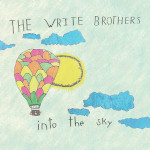A Record For Our Time: Write Brothers’ Testament To Spencer Bohren
Spencer Bohren came from the open sky and the cold hard realities of prairie fundamentalism.
His early life was a routine of relentless sun, strong winds, drenching rains and miracle springs after dusky winters that froze your soul. Surrounded by God’s creation and the abundance of nature, he grew within a discipline meant to keep the darkness outside of the campfire’s glow at bay. But Spencer was always attracted to the mysterious shadows beyond the safety of the firelight, compelled to plumb their secrets. Maybe that’s why he became one of America’s premier storytellers, a soul whose imagination was animated by the strains of desire that could not be contained within churchyard philosophy.
He became a wanderer, traveling the country with his family until he landed in New Orleans and discovered what he was looking for in the luminous crepuscular surroundings of taverns and clubs where he heard the strange, pulsing magic of Professor Longhair and found a company of like-minded pilgrims. Bohren set down roots in New Orleans but continued to travel the world, playing his songs and telling his stories. In recent years he put together a band to back him up, a group called the Whippersnappers that included his son Andre on drums and one of Andre’s compatriots from the Johnny Sketch band, Dave Pomerleau, on bass. Also in the lineup was guitarist Alex McMurray, a terrific songwriter in his own right.
Bohren and McMurray both knew another local songwriter, Paul Sanchez, a native New Orleanian of the Irish Channel who was a mainstay in the touring rock band Cowboy Mouth until Katrina. Sanchez left that life behind him after Katrina and fashioned a new identity for himself as a songwriter and leader of the amorphous, circus-like Rolling Road Show, a group that also relied on McMurray’s chameleon talents and genius as an accompanist.
Photo by Jim Brock Photography
Songwriter Jim McCormick found the key that unlocked his destiny by moving to Nashville from New Orleans and taking a job with a music publisher. Jim co-wrote a mess of songs that became country hits and found himself with a flourishing career as a songwriter commuting between the two cities. One night McCormick was sitting around his living room when he got the revelation that he should put together a band of New Orleans songwriters.
“I wanted to hear ‘The Road Goes On Forever’ by Robert Earl Keen,” he recalled. “I was googling it and I thought I would find his version. But the first version that popped up was the Highwaymen’s version.”
The Highwaymen was a quartet of singer-songwriters—Johnny Cash, Willie Nelson, Waylon Jennings and Kris Kristofferson—who were the creators of the individualist approach to country music popularly known as Outlaw Country.
“I watched that video,” recalled McCormick, “and I’d had a bourbon or two, I was up late, it was a quiet evening, and something in that video made me think ‘There’s four of us in New Orleans who can do that and have a lot of fun’”
The idea was powerful mojo and McCormick contacted two of his favorite writers, Sanchez and Bohren. They would call it the Write Brothers. McMurray was a natural fourth member of this group.
McCormick’s gesture was generous. He was writing number one hits in Nashville and offered to bring that craft back home where no publishing industry to support songwriters existed. But success is only one path, a hard road in its own sense yet not the ultimate goal for a creative soul. Fulfillment requires transcendence, yoking your spirit to a mysterious other that offers completion in the way the May sunlight coaxes the buds of millions of flowers into a symphony of fragrance on a ninth ward evening. The Write Brothers gave Jim something ineffable, something New Orleans, that Nashville never could.
Jim’s instincts were sharp. These four writers were all strikingly different but they had a collective sympatico that was not just difficult to predict, it was something of a miracle. Something that existed outside the very day-to-day lives of the quartet.
Who would have thought the fulcrum of this experiment would become Spencer Bohren, throughout his career a loner’s loner. But Bohren’s singularity made the others bind themselves to his orbit and be guided by his rhythms. Songwriting sessions took place around Bohren’s kitchen table. Once again, as sure as the halo of black and gold butterflies floated down from heaven in the heat of the garden outside of Bohren’s kitchen, magic took over and the extraordinary work of the Write Brothers’ First Flight took shape. The songs were imbued with the mystique of New Orleans, a joie de vivre that captured the explosion of emotions that the narcotic aroma of magnolias and night blooming jasmine brought to the streets of a city at the edge of dreams. In the studio, as they were finishing up, Paul Sanchez recalls it was Bohren who insisted that something was missing. Sanchez went outside and came up with a verse. The collaboration ensued on the spot and the Write Brothers had painted their masterpiece, “We’ll Be Together Again.”
The song summed up the timeless, invisible bonds behind the whole project, a joyous celebration of the here and now with a knowing wink toward an uncertain future:
Let’s raise our glasses and drink to the sadness/
And sing the familiar old songs with our friends/
All too soon comes the end of the tune/
Who knows when we’ll be together again.
Instrument Landing
Just when you think you’ve got it made/
That’s where the road got soft/
Buckle up you’ve got hell to pay/
That’s when the wheels come off.
The Write Brothers were an overnight sensation. First Flight will be remembered, along with Write Brothers’ performances at Jazz Fest and local clubs, as the stuff of legend.
Photo by Jim Brock Photography
Those moments of quiet ecstasy, like the carefree flight of those angelic butterflies in Spencer’s garden, are fragile and evanescent. Fans wanted a second album but there were delays. People had conflicting schedules. Paul Sanchez fell ill. But eventually the quartet reconvened around Spencer’s kitchen table for a second album’s worth of songwriting sessions.
“Mostly the writing came easily,” said McMurray. “Someone would come up with a line, or a phrase, and everyone would pitch in. Paul is really good at this. Somebody would say ‘Hey it’s a cloudy day’ and Paul would come up with a line and we’d go from there. We did 14 demos in five sessions. If I had known that [Spencer’s death] was even a possibility we would have made a better quality demo. Of course you don’t think ‘One of us might die so I’d better make a better demo.’ That was the source for two songs.
“To me the real money side of this whole thing is when the four of us get around to writing a song,” said McCormick. “We got to do that pretty well full-throated. Everybody was engaged. We just would get in there and go after it. It was like four hound dogs going at the meat on a bone and getting the thing done. I think about the kind of songs that make themselves hospitable to a group like ours. There aren’t many love songs; it seems like it gravitates more towards narratives or philosophical statements. If you look at those records by the Highwaymen, or the Traveling Wilburys, those are the kind of songs those albums are stacked with. You’ve gotta get four guys to agree on something.”
You can hear what each writer brought to that table when you listen to the album: Spencer Bohren’s cowboy poetry; Jim McCormick’s attention to the craft of assembling narratives and song structures; Alex McMurray’s whimsical observations on the human condition; and Paul Sanchez’s capacity for wringing the toughest personal emotions into a story. But there is also a collective sound that goes beyond the comfortable vocal harmonies and easygoing interlace of guitar parts. The Brothers had a creative dialogue that combined each one of their unique talents and filtered them through a mutual exchange which grew into a confluence, much like a family band.
The tone of these songs were strikingly different from the first album. Black clouds loomed over these visions, intimations of menace, the murky underworld that always co-exists with the ecstasy of life in New Orleans. Spencer was suffering from an as-yet undiagnosed illness that would take his life before the project was complete.
“It was already in the room with us and we didn’t know it,” said McCormick.
“It’s funny how these things work,” said McMurrray. “I remember when Spencer told me he had to go to the doctor, he was nervous. It was after a writing session and I said ‘I’ll tag along.’ We had already written all the songs.”
After the writing was finished the shadowy premonitions of the songs engulfed the band in a chilling penumbra. Spencer Bohren became gravely ill, ambushed by prostate cancer that had reached stage four, an inoperable, incurable spread. Plans for the recording moved forward with mortal urgency.
“It’s all too much to wrap your head around,” said McCormick, “to live with, to digest. The loss of someone you love. What happens is that the unconscious is at work. Many of the decisions were made consciously, but now we look back and we see how it was working for us and for the record. I can’t help but think that there was a lot of the unconscious at work, knowing what we were going through, knowing what Spencer was going through, influences your decisions whether you like it or not. That’s how so many of our experiences are.”
As he weakened, Spencer played some memorable gigs. In December of 2018 he performed during the Debbie Davis Christmas pageant at Café Brasil, playing “Silent Night” solo on his lap steel guitar. On a night of jollity and merriment people took a moment to weep. By the time of Jazz Fest 2019 Spencer had weakened to the point where he couldn’t take the stage without help from Andre. But his performances on the Gentilly Stage, with the Whippersnappers and then with the Write Brothers as part of the Paul Sanchez set, were an inspired coda to a storyteller’s life. The last song Spencer and the Write Brothers sang to their fans was “We’ll Be Together Again.”
The recording sessions were scheduled a few weeks later at Marigny Studios with Andre producing the record.
“My dad floated the idea of having me produce it in November 2018 after they’d finished writing all the songs,” said Andre. “They were going for the Threadhead grant and listing all the people who would be involved in the project. We didn’t meet until April. At that point my dad’s cancer situation was very much underway and a factor in all the decisions that were made from then on. There was a sense of urgency but scheduling was tough. My dad only had one day in the studio, a couple of weeks after Jazz Fest. He was doing radiation. He had just shaved his head and it was about two weeks before he died. That day we recorded as many songs as we could and we got my dad on four of them. We had two other days the following week scheduled, but he went back in the hospital. He played guitar on ‘Say It Like You Mean it’ and ‘Making a Life for Myself’ and sings the bridge on that. The very last thing he recorded was ‘Every Highway.’
“We knew Spencer was going fast when we went into the studio,” said Sanchez. “At Jazz Fest he was frail. By the time we went into the studio he had lost all his hair, he was really frail by then. He was on a lot of morphine. He was having a hard time concentrating through the meeting. He was up against it.”
Spencer was late getting to that first session and the others kidded him about it to lighten the mood.
“He was in a wheelchair being pushed by his son,” Sanchez recalled. “He was able to sing the bridge of a song I recorded of his, ‘Every Highway,’ with an intricate guitar part from Alex. Andre really wanted to capture it. It took him four passes. Spencer couldn’t get all the way through it. But Alex was beautiful and patient. It was very moving.”
Home is where the heart is, everybody knows/
But something in the wind is telling me it’s time to go.
“And then Spencer lay down, exhausted, in the control room and I went out and recorded a song of his, ‘Another Day.’ When I finished I went back into the control room to listen to it and Spencer was weeping and I reached down to grab his hand and he said ‘That’s not gonna do it, my friend’ and I hugged him and we both cried.”
Deal the cards, play another game/
It’s getting dark, I really shouldn’t stay/
Oh the time so easy slips away/
Sun goes down, there goes another day.
Spencer’s day in the studio was the band’s farewell to their dying brother.
“We were in there one day and he never came back,” said McCormick.
“I’ll never forget that day,” said McMurray. “Trying to get four people into the studio, it just didn’t get scheduled as soon as I would have liked. Spencer just made one session. It was like, sometimes people bounce back but of course he didn’t. How we got that one tune, that ‘Every Highway’ song was miraculous to me. That was the one we had to get. We kind of pushed it off all day and it was getting late in the day and Spencer was starting to fade so we just did it. It took about 50 minutes and we were able to stitch something together which was pretty remarkable, I think. We finally got that performance out of him.”
If I only had a pair of wings, then I could fly away/
But there ain’t no use in worryin’, we’ll all have wings someday.
“Spencer was so wiped out that he lay on the couch in the control room,” said McMurray, “and Paul’s out there doing his tune ‘Another Day.’ An amazing performance. We’re listening to it and Spencer is lying there in this narcoleptic haze. Paul hadn’t prepared to sing because of his own health issues. And it’s a big song to sing. It has a lot of voice and he pulled it off. Spencer kind of opened his eyes, looked at me and said ‘I finally know what that song is about.’”
Time that’s lost will not be found again/
Every hour we’re closer to the end/
Oh the time so easy slips away/
Sun goes down, there goes another day.
“He was as graceful as you could imagine under the circumstances,” said Sanchez. “He was happy about everything. Happy about the chance to make the record. Happy to be in the studio. It was a gift to know someone with that kind of grace. It was a gift to know him anyway.”
Time Flies
Spencer died soon after heroically finishing his contribution to the Write Brothers sessions even though he was suffering mightily. His final statement put to rest; it was left to his three compatriots and his son Andre to finish the work. It was far from an easy task, considering that Sanchez himself was in agony and barely able to sing. Both Spencer and Paul sang with a crack in their voices that added an otherworldly kinship to their performances, as if they were both looking past the horizon as they sang.
“We had three songs done with Spencer before he was taken from us,” said Sanchez. “We had most of the songs tracked. Andre and I were in the studio and were trying to find ways to fill the void that his dad’s loss would obviously leave and as we talked, the engineer was playing ‘When the Wheels Come Off’ and I said ‘The demo’s pretty clean, let’s take your dad’s verse and drop it in where Jim sang that version.’ Andre said ‘We can’t, it’s recorded faster.’ I said ‘It’s digital, man, just slow it down and make it fit.’ So we did. That was a song that Spencer actually dreamed.”
Andre had a lot on his plate as the producer, finishing up the album that had such immense promise but was still only a rough sketch when Spencer died.
“My biggest job as producer was to make sure the sessions ran smoothly and in a timely manner, but I also had a big hand in the musical arrangements for most of the songs,” Andre noted. “I wrote the horn parts, and played a lot of instruments [drums, percussion, keyboards, lap steel, banjo], though not necessarily at the time of the original sessions. There was plenty of tweaking to do to make sure the final record met all of our high expectations.
“While my dad was only able to record on three songs in the studio (‘Say It Like You Mean It,’ ‘Making a Life for Myself,’ ‘Every Highway’), we built two more songs around the demos that they had recorded around his kitchen table, and that way we were able to get more vocals from him. Those songs are ‘She Picked Up What I was Putting Down’ and ‘When the Wheels Come Off.’ You can hear the difference in my dad’s vocals on both of those songs, because it wasn’t recorded in a controlled environment, but it didn’t feel right to leave them off, and nobody else could deliver ‘She Picked Up…’ with the same wit as he did, so we worked hard to make those songs work. Plus, he wrote all of the songs with the other three Writes, so he’s very much part of the songs themselves.
“The last thing we recorded on the one day my dad was in the studio was his song ‘Another Day,’ with only Paul singing and me on the piano. We did one take, and Paul sang the hell out of it, and when we went into the control room to listen back, it had my dad in tears. Paul really delivered the most powerful vocal I’ve heard from him, and I am forever grateful that my dad was there to hear that be recorded.”
Oh the time so easy slips away/
Close your eyes, there goes another day.
“A lot of credit is due to Andre for his musical ability and his ability as a producer and how he was able to work with the three of us,” said McCormick. On ‘Another Day’ Andre had the idea of ‘What do you say I just play the piano and you sing?’ Paul thrilled to that idea. That was the kind of thing that Andre did for us. He surprised us with his ideas.
The sessions continued in a sepulchral atmosphere, but the goal was clear—this was to be the band’s testament to Spencer. McMurray’s ability to add levity to the bleakest of situations was never more apparent than in these moments, when he took the lead on the carefree, “Do It,” which became the album opener, and on the Sanchez composition “I Don’t Wanna Play Rock and Roll.”
“It was my turn to do a Paul song,” said Alex, “because he did one of my songs on the last record. Jim was gonna do a song of mine called ‘The Last Train’ so I thought we needed more up-tempo shit. We decided between Andre and I to just go for it and be as stupid as we wanted.”
“I was impressed with Alex’s ability to be funny in that moment,” said Sanchez. “I was moved by how Jim was so deeply saddened he could barely speak at the sessions. I knew we were delivering a message. We were saying goodbye to a friend and we had the rare privilege on that day he was in the studio of having him there to watch us love him and record our goodbye to him.”
Jim McCormick has the final moments of the album, and his earnest baritone voice comes across on “The Last Train” and “Time Flies” like Johnny Cash recording his bone-chilling last statement with producer Rick Rubin.
“I don’t think I could have made a more poignant choice of Alex McMurray’s songs for the record,” said McCormick of “The Last Train.” “I just went to the place of loss we were feeling and we were all there. I think we were grieving, but we were present, we were there, for Spencer, for Andre, for each other. There was great dignity to the sessions.”
McCormick himself was surprised at the gravity his version took on in the moment, the sense of staring into the abyss.
“I asked Andre if I could just sit down and talk the song. Just let me sit down and communicate what’s being said here. That’s when he stripped everything away and just let me whisper it and talk it—just to be fragile with it.”
Considering this performance today, it’s hard not to see a consonance between the grieving for Spencer’s passing that’s palpable in McCormick’s vocal and the stunning strength of the COVID-19 pandemic that has stricken New Orleans even as the album was released.
“A record for our time,” McCormick noted.
“A lot of songs on this record have a particular outlook of ‘Pick yourself up, you’ve got to move on because life goes fast’,” said Andre. “Starting with ‘Every Highway’—that really was some dagger lyrics taken in context—all the way through ‘Time Flies.’ ‘Last Train,’ there was just one vocal take of that. It was too good to do another one. It’s so personal. It almost felt like Jim was just conversing with you as a listener.”
“Last Train” is a classic example of a song’s meaning shifting with context. McMurray wrote the song when he was working as a singing pirate at Disneyland in Japan, a particularly forlorn period of his life.
“If you miss that last train you ain’t going home,” said McMurray. “In Japan everything shuts down after 12:30 a.m. There were times I didn’t make the train so I had to walk the streets until 6 a.m. when the trains started running again.”
They’ve closed all the stores locked all the doors/
The last train will roll with or without me…
McCormick’s voice, with its deep gravitas, resembles Cash even when he’s being lighthearted, but on ‘Time Flies,’ a direct reflection on mortality co-written by Threadhead founder Chris Joseph and Sanchez, McCormick closes the album like a Gregorian chant echoing through a Gothic cathedral.
Try as you can, it’s all water in your hand/
You realize time flies/
Into the sky time flies/
Before your eyes time flies.
“That’s where I was, that’s where I wanted to go,” said McCormick. “The record can’t be all of that but we hit that note on the record a couple of times, because it was what we were living through while we made the record. Context kind of changes the way you listen to the album. I look back on the record through the lens of Spencer’s journey.”
Into The Sky
The band struggled to complete the album and the task of eulogy, but not of mourning. Of course they would play together again, but how soon and in what fashion was very much up in the air. Summer went by in its suffocating, overwhelming stasis and fall’s first chill brought a stirring in the blood. It was decided that the Write Brothers would do a tribute show to Spencer at the Dew Drop Inn on the Northshore around Thanksgiving time. Plans were afoot and thoughts ran to include several musicians who’d played with Spencer over the years but in the end in was just Jim, Paul and Alex with Andre taking over his father’s role and Dave Pomerleau supporting on bass.
The Dew Drop is a 19th century structure that feels like an old country church or meeting hall, really not much more than a covered shed with its large windows open to the elements, hard wooden benches and crosses cut in a pattern all around the building. There is in fact a church next to it and chicken dinners were being served to those who wanted them. The crowd huddled together in their overcoats. Many people brought lawn chairs and sat outside amidst the falling leaves being whipped through the chill breeze swaddled in blankets like they were at a football game. The frosty evening gave an intimate feel to the warm glow inside the building as the band played a set that moved me to the point where I was unable to take notes. It was very much like Spencer himself was animating the proceedings from some alternate space.
“It was really lovely because it was the kind of gig he would have dug,” said Sanchez. “His presence was a part of the show. And if we had to say goodbye to each other on stage he was there to say goodbye along with us. It was the last time we played and his body wasn’t there but his spirit was. His son and his grandson, his family and the people who loved him were there and I felt his joy. Everyone rose to the level that Andre hoped we would rise to.”
Andre played his father’s lap steel on “Another Day” and “Ode to Billie Joe” and sang beautiful harmonies.
“It was the first time I played lap steel in public and it was powerful playing those songs, playing his music and his lap steel,” said Andre. “I felt like that was a roomful of people who loved him. There was a lot of powerful music coming from the stage that night. It was loose in a very good way.”
McCormick was struck by Andre’s performance that night.
“He stepped right into the bandleader position,” Jim recalled. “When he sang those parts that night it was like…I didn’t know that he was gonna sing those lines. I was like ‘Where is that coming from? Who did that?’ It was a really, really beautiful night. Yet there was a big hole in my heart. There was a big absence up there. There was anxiety as we headed into the night, like ‘What are we gonna do as the Write Brothers?’ Both that night and with the record, which we were not finished with yet. When Andre took the lead that night he really took the lead in finishing the record. Seeing it through. It was so hard to face.”
Alex McMurray gave my wife and me a lift back to the Bywater after the gig. “I’m kind of glad that we didn’t have all the special guests,” he mused. “We’ll save that for the next time.”
Except there hasn’t been a next time.
“We were supposed to do a tribute at Jazz Fest this year,” said Andre. “We had planned on doing more tributes and then Jazz Fest contacted me about doing a tribute so I backed off those plans. Now we are where we are and who knows what’s going to happen.”
So now I’m sitting at my computer on a Tuesday night, contemplating the end of this story and watching Alex McMurray celebrate the album’s release by doing solo performances of several songs during his weekly Facebook livestream from the virtual club he calls the “Faraway Lounge” located in his living room. What is the future of this group McMurray jokingly refers to as “The Left Brothers” in this era of pandemic?
“I don’t see how crowds will happen for a while,” said Andre. “I don’t see it happening soon.”
Perhaps it will end up as a livestream. The vision that Jim McCormick had in a late night video session could end just as the idea had gestated, as a media event.
However it ends, McCormick is satisfied that the story was completed.
“In context, the first record we made was before we ever performed a show,” said McCormick, “so that record really turned out to be a script for what would flesh out and blossom onstage. We went into the composing of this record with all of that on the table. When we put it together it was like a shooting gallery with the four of us with pistols just going bam bam bam. Finish off a song in 17 minutes, you know? All right, let’s write another one. It’s such a joy to do that process with those three. This album is the other side of what we were doing on the first album when we started. The first album we were coming together. In this album we were coming apart without even knowing it.”









